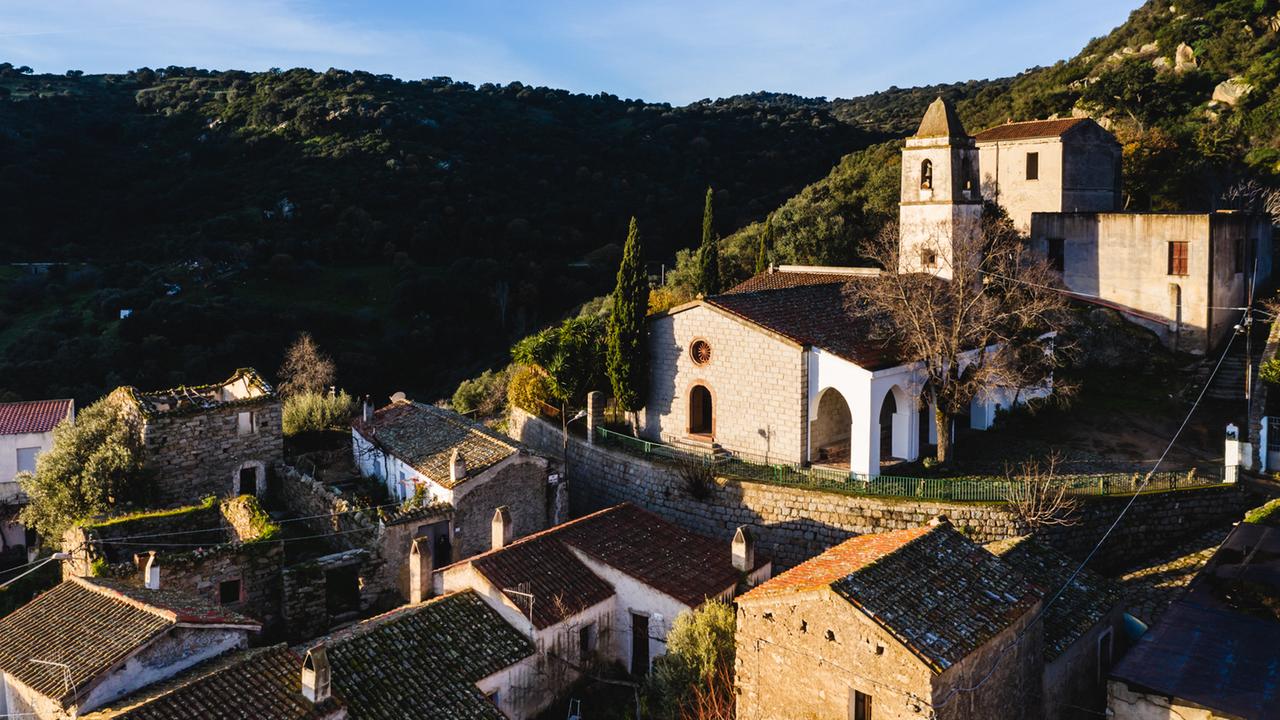The Legend of Lollove 0 Comments

The Village That Doesn’t Grow, But Never Dies
112 Km and an hour and a half by car from the Gabbiano Azzurro Hotel & Suites, at just 15 km from Nuoro And The Barbagia County, there is a medieval gem: a little borough of a few stone houses, frozen in time, among the mountains, surrounded by an oak grove, with a 1500’s Gothic church that a few centuries ago housed an ancient monastery of penitent Franciscans. It's to those nuns that the legend belongs, handed down from generation to generation, telling they were blamed by the villagers of lustful relations with local shepherds and were therefore driven out of the village. But the nuns, who claimed their innocence, cursed the small village of Lollove: "Lollove as a esser chei s'abba è su mare: no as a crescher nen parescher mai!" "Lollove you will be like the water of the sea; you will never grow and you will never die".
The curse seems to have become true because the village, although not disappearing because of the few inhabitants still living there, has remained unchanged in the same dimension. In the village there are no doctors, schools or post offices. Electric light only came into use at the end of the last century.
Between the nineteenth and twentieth centuries, the timeless place inspired writers and artists including Sebastiano Satta and, above all, A Sardinian Nobel prized author: Grazia Deledda who in 1920 chose it to set her novel "The mother", recounting the forbidden story between Paulo, a young priest, and the beautiful Agnes, almost underlining the legendary unbecoming and smoky atmosphere of the village. Films and plays were inspired by her opera.
In 1896 the writer Sebastiano Satta from Nuoro, reported in his works that at the time 367 residents lived in 56 houses in Lollove and that the streets were obstructed by rocks blocking the passage of wagons and horses. Until 1950 Lollove had over 400 inhabitants, but today there are only a few dozen left.
In the religious festivals the small village gets a little active but it is in November that it comes to life with “Vivilollove”, in the context of Autumn in Barbagia when visiting means getting immersed in ancient times with the daily manual, baking and cooking practices.
Boroughs like Lollove are destined to disappear because the last inhabitants are elderly and with their departure the village would also end with all the traditions, customs, stories and legends. To discourage this tendency, even in Lollove, as in many parts of Italy, the initiative of houses sold for one euro is on-going, intended almost for young people, to encourage resettlement because what would be lost are not so much the houses as much as the atmosphere and history distinguishing these small wonderful boroughs.
Simone Ciferni, founder of the Lollovers project, with the help of the few remaining inhabitants, has the plan to relaunch Lollove and make it a digital detox destination, a place where to spend a length of time away from social media and other digital environments including not using smartphones, tablets, PCs and other similar devices, to achieve a healthier and balanced relationship with technology, to take a break, breathe fresh air, slow down and go back to the past feeling perceptions that were no longer felt in everyday life, literally pulling the plug and staying away from technology and anxiety for a day or two. This kind of tourism is far from the classic idea of a holiday, and is based on the experience of visiting a unique village, suspended in time and risking extinction.
[...] only the sound of the wind could be heard outside, accompanied by the murmuring of the trees of the road behind the small parish: a wind not too strong but incessant and monotonous that seemed to wrap the house...
(Grazia Deledda- "La Madre", inspired by Lollove)
--
Written by Daniela Toti
Teilen Sie uns Ihre Meinung mit!